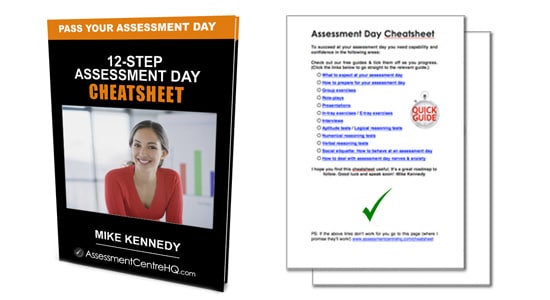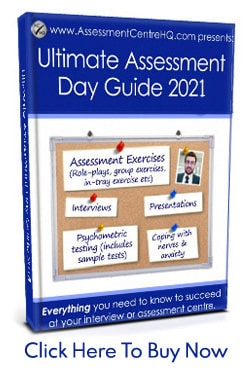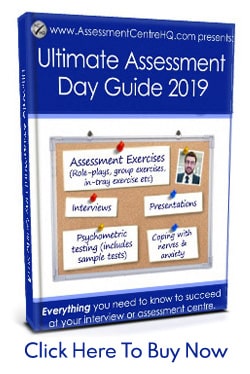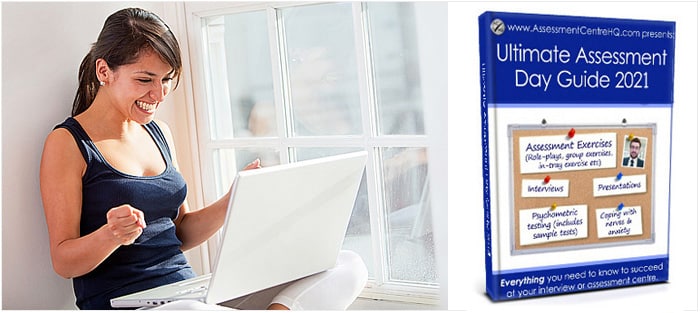How To Prepare For An Interview Or Assessment Centre: The Ultimate Guide
This free guide will teach you how to prepare your mind & body for an interview or assessment centre so you can perform to your absolute maximum when it counts. This is one of our most popular posts; be sure to bookmark it, share it etc. It’s useful!
Useful starting-point resource
- You can get hold of a full suite of interview preparation tools here.
Download our Ultimate Assessment Day & Interview Guide 2022 here. (It's packed with tips, tricks and insider-secrets to help you succeed.)
In this guide you’ll learn:
- The 3 areas where you must invest preparation time ahead of your interview
- The 10 steps you need to follow to tune up your body and mind before your interview
- 3 elite techniques that will help you stay calm and prevent anxiety
- How to respond to difficult interview questions
- How to handle the infamous moment: “So, do you have any questions?” (this is vital )
- Why having a pre-interview checklist is so important (and see our own checklist)
- 2 quick tips to keep you feeling comfortable & energetic on the day

‘Why is it so important to learn how to prepare for an interview?’
An interview is, essentially, an opportunity to unlock the next chapter of your life. It’s important. So don’t leave anything to chance: Preparation is crucial.
Put simply, successful candidates tend to have something in common; they are usually better prepared, more relaxed and more confident than the unsuccessful candidates. This doesn’t happen by mistake, it happens by design.
Most candidates prepare by hitting the books for a spot of revision and also do some online research. That’s a great start, but there’s much more you can do to increase your chances of success.
Preparation is the key to success and this article will lay everything out for you in clear detail. I hope you enjoy it and find it useful
Before Your Interview
Being well prepared is the key to success and this will make you feel relaxed and confident on the day itself. This means making a time investment to prepare in 3 areas:
- The Company – the role, team, company, industry
- Your Wellbeing – your physical and mental health
- The Interview/Assessment – the actual exercises and tests
How To Prepare For An Interview: The Company
Fully understand the nature of the role you’re applying for.
The HR department should be able to provide you with a job description. If not speak with the line manager (the person who would be your new boss) who you should call anyway to discuss the role and future aims of the team/company etc.
This may seem an overly bold step, but we guarantee they will be impressed by your initiative and you will gain some form of valuable insight that will help you on they day (plus, you will steal a march on the other candidates who are your competitors).
PRO TIP: The job description will have a list of the core competencies required to fill the role. It’s basically a checklist of what the employer is looking for. Gold dust!

- If you’re applying for a promotion, network within the company to learn more about the role, call people who already work in the team (your peers) to do further research. What are their key challenges at the moment? What type of person are they looking to add to the team? What is their boss like to work for? This is a very rich vein of insight, so mine it for all its worth!
- If you’re applying from outside the company you can still do the above. It demonstrates drive and lateral thinking. Don’t ever be afraid to grasp the nettle and do something unconventional. Nine times out of ten it pays off.
- Research the company. Google their annual report for shareholders – this provides great background information on the company’s current performance and future aims. It’s gold dust. (Plus you’ll sound like a genius during your interview when you drop some stats from their annual report.)
- Research the industry. Understand recent market trends. This can be tedious, but boy does it carry weight during your interview if you seem to have a finger on the pulse of the market.
NOTE: You can practise the actual assessment exercises and psychometric tests that employers use here.
.
Stop worrying! Download a 12-step assessment day cheatsheet & be perfectly prepared.
Click here to download your copy

.
How To Prepare For An Interview: Your Wellbeing
This may seem obvious but it remains vital and will benefit you hugely: Live your life healthily in the weeks prior to your interview or assessment. There’s nothing worse than having to attend an important and potentially life-changing event if you’re ill, or feeling run down or (heaven forbid) hungover.
- In our ‘personal and wellbeing‘ section we have much more information on healthy living, both physical and mental. You may live your life in a super-healthy way already, but if you don’t it can be tough to suddenly change. It’s incredibly difficult to alter our behaviour (it’s one of the most difficult things a human being can do). If you can live your life in a more healthy way, if only for a few weeks, it’s a game changer in terms of your chances of success.
- Get into a regular sleeping pattern. 7 hours’ sleep each night as an absolute minimum. Ensure you’re actually relaxed before going to sleep – this will give you a better chance of enjoying deep & genuinely restorative sleep. Try reading fiction for an hour before going asleep (this is a great way to put your cares and worries out of mind).
- Exercise 3 times a week for at least a fortnight before your interview/assessment event (a whole month prior is even better). If you’re really out of shape, start by doing something that’s not weight-bearing, swimming is ideal.
- Make the effort to eat balanced and healthy meals. The BBC’s nutrition information is a great place to learn the basics quickly. Eat plenty of fruit and vegetables. It’s easier than you may think (you can microwave them in a bag nowadays!). Too much of a hassle? Drink 3 big glasses of pure orange juice a day. Take a multivitamin each morning with your breakfast. It’s easy to enjoy good nutrition and it makes a big difference to your health.
- Don’t drink excessively for a least 1 week prior to your interview/assessment. Self-explanatory really. Even having just a few drinks the night before will negatively affect your performance the next day.
- If you have a busy schedule plan relaxation time like any other appointment. Put it in your diary and ring-fence that time, protect it with zeal – it’s important.

- Spend some time outdoors. In the internet age it’s easy to be seduced by the mega-stimulation that’s available through our computer screens. But spending time outdoors is crucial for a clear and healthy mind. It brings perspective. Plan three 1 hour periods to do this in the week prior to your event. If walking in nature isn’t your bag (or the weather is awful) lose yourself in music or meditation or prayer. Do whatever you find restorative.
- Spend some time with your family and friends. (Ideally non-work friends.) Humans are simple creatures at heart and spending time with your family or close friends is good for the soul.
- Give yourself a personal makeover. Have your best business outfit professionally cleaned a few days beforehand, get a sharp haircut, polish your shoes etc.
- Go to bed early the night before your interview or assessment event. (Two hours earlier than you normally would is ideal.) There is nothing more beneficial to your performance than a well-rested and healthy body in partnership with a focussed and clear mind. A good night’s sleep contributes to this enormously.
How To Prepare For An Interview: The Actual Interview/Assessment Exercises
Ok, now we’re into the real meat of the preparation. Preparing for the interview and assessment exercises that you will be measured by on the day is obviously critical to your success as this is what will -ultimately- determine whether you get the role. All your other preparation has been about giving you the best chance to succeed in this area.
Firstly, let’s go over a couple of basics:
- Review, optimise and understand your CV/resume. Never think of it as a fixed document. It should live and breathe, this is a document you should be tweaking and tailoring regularly. Bespoke it to each prospective employer before you send it and familiarise yourself with it before the interview. Be clear on the reasons you left each role, because you will probably be asked to walk your interviewer through your career thus far. (Print off several spare copies and take them with you on the day.)

- Prepare a list of questions you are likely to be asked and your responses – Doing this beforehand can prevent some uncomfortable moments during the interview. Here are five very helpful articles that will give you a fantastic idea of what to expect (and what to say in response): 1 | 2 | 3 | 4 | 5

- Prepare a list of your own questions to ask them. This is important because it demonstrates your interest in the role and the company (and therefore your hunger to be the successful applicant). This Guardian article has a superb list of questions that will be a great starting point for you.
Fully understand and practice the assessment exercises you will perform
We’ve written tons of in-depth articles which will give you expert advice and secret techniques to succeed. They include practice tests, and plenty of examples and exercise samples:
- An Introduction To An Assessment Centre (A must-read for the corporate world)
- Assessment Centre Exercises (Role-plays, presentations, in-tray exercise, e-tray exercise, group exercise)
- Psychometric Testing (Verbal reasoning, numerical reasoning, personality questionnaires)
- Interviews (Our ultimate guide tell you how to stack the odds in your favour before, during and after you interview)
- Personal & Wellbeing (Coping with nerves & anxiety, social etiquette etc)
- Resources (Essential tools and equipment)
Don’t forget this! (It’s super-useful.)
- You can get hold of a full suite of interview preparation tools here.
On the day of your interview or assessment centre
- Exercise for an hour before your interview or assessment. This is huge. Get up early if you need to. Exercising will not only burn off any negative energy and anxiety in your body, but it will substitute that negativity for endorphines. (Peptides created by your pituitary gland during exercise that promote a feeling of well-being. If you do this we guarantee you will head to your interview or assessment with a clearer mind and you will feel more relaxed, more confident and better equipped to deal with what lies before you.
- Check you have everything on this list before you leave home:
- Directions to venue / invitation letter etc
- Folder / Folio
- Pen/pencil/highlighter
- Notepaper
- Sticky notes
- Bottle of water
- Snack bars / granola bars
- USB flash drive with copies of any required digital documents (presentations/showreel etc). Email a copy to yourself (or save to your Dropbox) as an extra backup.
- Hard copies of the above, including your resume/CV and any other support documents
- Presentation pointer (a bona fide ‘must buy’ if you’re performing a presentation)
- Mints (essential for smokers!)
- Caffeine tablets (it’s going to be a long day…)
- Get to your destination at least 1 hour earlier than you need to. Allow double the amount of time you think you’ll need to get there.
- Arriving early will allow you to reflect and compose yourself before you begin. You can review your notes and you’ll feel ‘ahead of the game’ and in control.
- If you arrive late (which could easily happen due to circumstances outside of your control – traffic, transport delays, an emergency of some kind etc) you will feel on the back foot; defensive and on edge.
- As with most of the advice here, it may seem unnecessary, overkill even, but it’s about giving yourself the best chance to succeed come what may. Sure you could arrive late and still perform well, but why not do everything you can to ensure you don’t have any extra challenges to overcome on an already stressful and demanding day?
Two quick tips to keep you feeling healthy and energetic on the day:
- Make sure you have a substantial breakfast and keep a bottle of water with you at all times. Your breakfast will be your fuel for most of the day, so eat well. Your brain is 70% composed of water and it doesn’t function at an optimum level unless it’s properly hydrated. (You’ll be doing lots of talking and nerves can also make your mouth dry. Keeping your throat, mouth and vocal chords lubricated will be a comfort.)
- Have a couple of bananas or energy/granola bars in your bag. During breaks it will help to snack for extra energy, even if you don’t feel hungry. (There’s a reason Roger Federer eats bananas in between games of tennis – any sports or nutrition expert will tell you bananas are ideal for replenishing energy and contributing positively to stamina levels.)
Feeling relaxed and confident on the day hinges on your preparation. If you make the above investment in time to prepare we guarantee you will go into the day feeling relaxed and confident and with the best possible chance to succeed.

Practise, practise, practise
Nothing will improve your competence on the day more than familarity with the tasks. You can practise the actual assessment exercises and psychometric tests that employers use here. Do it!
Podcast
Listen to episode 8 of our podcast – “Interview Tips”
Two good books that will help you prepare
‘Now you’ve been shortlisted: Your guide to being successful at interviews and assessment centres’
This is a fabulous book by Denise Taylor that’s packed with useful information and advice. You can find it here: Amazon (UK) | Amazon (USA)
“You’re Hired! Psychometric Tests: Proven tactics to help you pass”
This excellent book by James Meachin and Ceri Roderick is a good read and will give you a deeper understanding of psychometric testing, what to expect and how to succeed: Amazon (UK) | Amazon (USA)
Some final questions for you…
- Do you have to take a numerical reasoning test or a verbal reasoning test? If so you may want to check out the aptitude tests section of the site.
- You can find practice tests and tons of free advice on every other type of ‘reasoning test’ too: numerical, verbal, abstract, logical, inductive, diagrammatic, spatial, mechanical comprehension, UKCAT and Watson-Glaser tests.
- Worried about your assessment day? Maybe you’re worried about performing a presentation or preparing for an interview or group exercise or in-tray exercise?
- Perhaps you’d like some guidance on how to deal with nerves & anxiety at your interview?
- Lastly the Tools and Resources page is packed with useful equipment and ‘A’ List recommendations that will make your life easier.
Related Reading:
- Dollar Tree Online Application & Exam Guide
- Arup Assessment – Test & Interview Preparation
- How to Prepare for a Digital Interview?
Thanks for reading!
We hope you enjoyed our guide? We’d love to hear your feedback on this article and also to learn how your interview or assessment centre goes, so please do get in touch and let us know.
Thanks and good luck!
Turbocharge your employability NOW
Get your copy of our Ultimate Assessment Day & Interview Guide here. It's packed with tips, tricks and insider-secrets to help you succeed.
.
© Copyright AssessmentCentreHQ - All Rights Reserved
.







